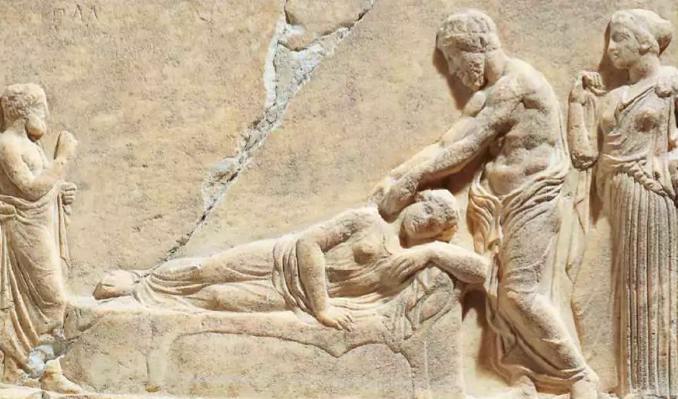If you fell ill in ancient Greece, your experience would be a strange mix of the spiritual and the scientific. Early Greek medicine was heavily influenced by the belief that sickness was caused by angry gods or magical curses. But as time went on, a new wave of physicians began to seek more rational explanations for what was happening inside the body. So, what kind of treatment could you expect?
Table of Contents
🛌 Healing in the Temple
For many, the first stop was an asclepeion—a temple dedicated to Asclepius, the god of medicine. The process was simple: you would sleep in the temple overnight, hoping to be visited in your dreams by the god himself, who would reveal your cure. The next morning, you would describe your dream to a priest, who would then prescribe a treatment, which usually involved prayers, exercise, and herbal remedies. If you were cured, you’d leave a small model of your healed body part as an offering of thanks.
🩸 The Theory of the Four Humors
The famous physician Hippocrates helped popularize a more scientific—though incorrect—theory. The idea of the four humors proposed that the body was made of four fluids: blood, yellow bile, black bile, and phlegm. Illness was believed to be caused by an imbalance of these fluids. For example, if you had a fever and were sweating, you were said to have too much blood. The solution? Bloodletting, either by cutting the skin or using leeches to drain the excess. Fainting was often seen as a sign the treatment was working.
⚕️ The Birth of the Modern Doctor
Despite these strange beliefs, this was the era when modern medicine was born. Physicians like Hippocrates were among the first to accurately describe conditions like epilepsy, arguing it was caused by the brain, not demonic possession. He and his followers emphasized careful observation of symptoms and developed a code of ethics—the Hippocratic Oath—that established the importance of honesty, confidentiality, and doing no harm. This revolutionary approach laid the groundwork for medical practice for centuries to come.
Bibliography:
BBC History Specials: Ancient World, 2025. Immediate Media Company London Limited, 2024.
- Curses: The History of the Evil Eye and Binding Magic
- Magical Plants: A Witch’s Garden of Herbs and Poisons
- Roman Magic: Curses, the Strix, and Everyday Protection
- Circe: The Greek Sorceress of Transformation and Myth
- Greek Magic: Hecate’s Power, Oracles, and Enchantresses
- Japanese Magic: Yōkai, Onmyōdō, and Supernatural Folklore
- Empress Chen Jiao: The Royal Scandal of Witchcraft in Han China
